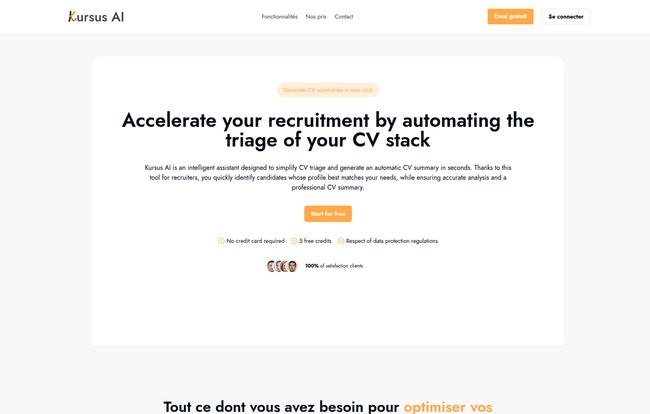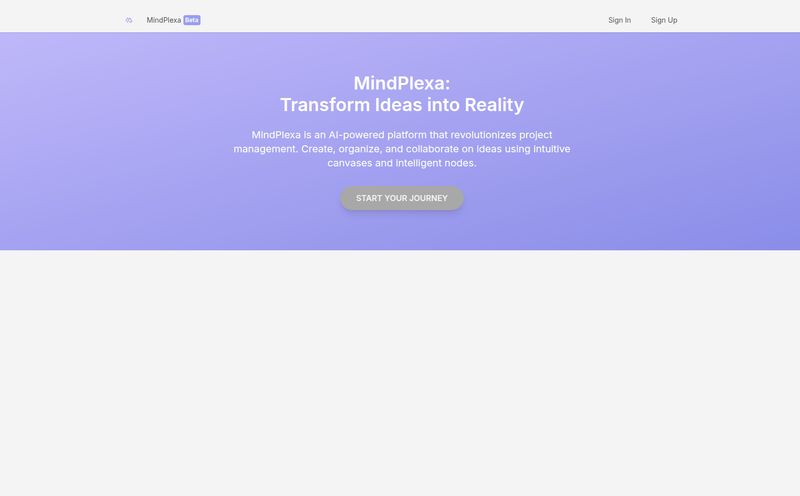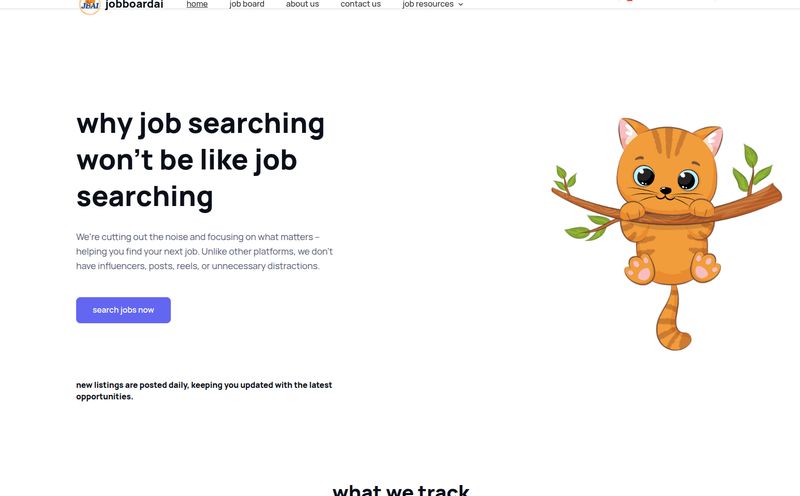You post a great job opening. You’re excited. You’re hopeful. Then it happens. The flood. Your inbox, your applicant tracking system, whatever you use, it suddenly looks like a clown car at the circus—impossibly, ridiculously full. We’ve all been there, staring at a mountain of 200+ CVs, and the enthusiasm just… drains away. It’s the single biggest time-sink in recruitment, and frankly, it’s about as fun as a root canal.
For years, we’ve just accepted this as part of the job. The manual, eye-glazing work of sifting through resume after resume, looking for those golden keywords. But what if there was a better way? The term 'AI' gets thrown around a lot these days, often promising to solve all our problems. Most of the time, I’m skeptical. But every now and then, a tool pops up that actually seems to get it. A tool that isn't trying to replace you, but just give you back your time and sanity.
I’ve been hearing some chatter about a platform called Kursus AI, which claims to automate the most painful part of the process: the initial CV triage. So, I decided to roll up my sleeves and see if it’s just more tech hype or a genuine game-changer for recruiters.
So, What Exactly Is Kursus AI?
In the simplest terms, Kursus AI is an AI-powered assistant designed to do one thing really well: read resumes for you. Think of it less like a robot overlord making hiring decisions and more like a super-fast, hyper-efficient intern who never needs a coffee break. Its entire purpose is to take that massive, chaotic pile of CVs and quickly analyze them against your job requirements.
It generates a clean, professional summary of each candidate's profile in just a click. The goal isn’t to pick the final candidate, but to slash the time you spend on the initial screening. It helps you instantly spot the profiles that are a strong match, so you can focus your human expertise on the people who actually have potential, instead of the 80% who clearly aren't a fit.

Visit Kursus AI
How It Works: From a Mountain of PDFs to a Manageable Shortlist
Getting started seemed straightforward enough, which is a huge plus for me. I don’t have time to learn a complex new system. The process is basically three steps.
First, you create a job post within the platform. This is a critical step because this is what the AI uses as its source of truth. Your job description becomes the sieve, and the incoming CVs are the river gravel you're about to pan for gold. The better your job description, the better the AI can do its job.
Next, you feed it the resumes. You can upload the documents you've received, and the platform gets to work. This is the part that feels like magic. Instead of you opening PDF after PDF, the machine does the heavy lifting. I also noticed it’s fully mobile-compatible, which is a nice touch. I can't tell you how many times I've tried to quickly review a candidate on my phone between meetings, only to be thwarted by a clunky, non-responsive website. So, kudos for that.
Finally, you get the output: a summary of each CV. This is where you see if the tool is worth its salt. It pulls out the key info, matches it against your criteria, and presents it in a digestible format. Suddenly, that mountain of 200 resumes becomes a much more approachable list of, say, 20 or 30 genuinely interesting profiles. Now that's a task I can handle before my morning coffee gets cold.
The Good, The Bad, and The AI: My Personal Pros and Cons
No tool is perfect, right? Here’s my no-fluff breakdown of what I loved and what gave me pause.
What I Really Liked About Kursus AI
The biggest, most obvious win here is the time savings. It’s not an exaggeration to say a tool like this could give you back hours every week. Hours you could spend on actual interviews, on strategy, on sourcing passive candidates—you know, the stuff that actually moves the needle.
I was also pleasantly surprised by the summaries. They weren’t just a jumble of keywords. The platform promises “accurate and professional” summaries, and from what I can see, it delivers. It provides a coherent overview that’s genuinely useful for making a quick first-pass judgment. And the user interface is clean and simple. You don't need a PhD in software engineering to figure it out, which is a low bar that a surprising number of B2B tools fail to clear.
Where It Could Be Better (Let's Be Real)
Now, for the other side of the coin. My biggest hesitation with any AI resume scanner is the nuance factor. AI is great at matching explicit skills and keywords. “Five years of Java experience.” Check. “Proficient in Google Analytics.” Check. But can it spot the hidden gem? The candidate with a weird but incredibly relevant background? The one whose cover letter shows immense passion but whose CV doesn’t tick every single box? I'm not so sure. There's a risk of becoming too reliant on the tech and overlooking unconventional talent.
Then there’s the credit-based system. On one hand, it’s transparent. You pay for what you use. But on the other, it can feel a bit restrictive. If you have a massive influx of candidates, you might find yourself burning through credits faster than you expected. You have to be mindful of your usage.
And finally, the classic AI principle of “garbage in, garbage out” applies here. The effectiveness of Kursus AI is directly tied to the quality of the resumes you feed it. A poorly formatted, vague, or just plain bad CV will likely result in a poor analysis. The tool can't read minds, it can only interpret the data it's given.
A Look at the Kursus AI Pricing Tiers
Alright, let’s talk money. Pricing can make or break a tool, so how does Kursus AI stack up? They offer a few different plans, which I appreciate. It’s not a one-size-fits-all approach.
Here’s a quick breakdown based on the information on their site:
| Plan | Price | Key Features |
|---|---|---|
| Free | 0€ / month | 1 job post, 5 credits/month, basic CV triage |
| Starter | 49€ / month | 5 job posts, 200 credits/month, history & export |
| Business | 99€ / month | 15 job posts, 500 credits/month, advanced stats, ATS integration |
| Enterprise | Custom | Personalized plan for larger needs |
The Free plan is fantastic. It’s not some timed trial; it’s a genuinely free tier that lets you test the waters. For a solo recruiter or a tiny company that hires infrequently, this might be all you ever need. The Starter plan seems like the sweet spot for many small to medium-sized businesses that have a regular flow of applicants. Once you get to the Business tier, you're looking at more serious volume and the need for features like ATS integration. It’s a logical progression.
Is Kursus AI the Right Tool for Your Hiring Team?
So, the million-dollar question: should you use it? My take is this: if your team regularly deals with high-volume applications for roles with clear, definable skills, then absolutely. Tech recruiters, agency recruiters, corporate HR for large companies—you guys will feel the impact almost immediately. The sheer amount of time you’ll get back is a massive return on investment.
Who might not need it? If you're hiring for extremely niche, creative, or senior leadership roles where every single application warrants a deep, personal read, an automated tool might be overkill. If you only get 10-15 applicants per job, you can probably manage that manually without too much pain.
But for the vast majority of us caught in the resume deluge, this is a lifeline. It's not about outsourcing your brain; it's about automating the most monotonous, low-value part of your job so you can apply your human intelligence where it matters most: building connections with great candidates.
Frequently Asked Questions About Kursus AI
I saw some common questions on their site and thought I’d tackle them here from my perspective.
What is Kursus AI, in a nutshell?
It’s an AI assistant that analyzes resumes for you. You upload a stack of CVs, and it quickly generates summaries to help you identify the most promising candidates, saving you from manual screening.
How much time can it actually save?
This will vary, but imagine you spend 3-4 hours screening 100 CVs. With a tool like this, you could probably get a qualified shortlist in under 30 minutes. It's a significant reduction.
How does the credit system work?
It’s pretty simple: one credit equals one CV analysis. So if you're on the Starter plan with 200 credits, you can process 200 candidate resumes that month.
Is Kursus AI compliant with data protection laws like GDPR?
The site explicitly mentions “Respect of data protection regulations.” Given that it's a French company (.fr domain), they are operating under GDPR, which is one of the strictest data privacy laws in the world. This is a huge point of trust for anyone handling sensitive candidate data.
Will this AI replace human recruiters?
Let me be crystal clear: no. Emphatically, no. It replaces the tedious task of staring at documents. It can't conduct an interview, it can't read body language, it can't gauge cultural fit, and it can't negotiate an offer. It’s a tool, like a better version of a keyword search. You are still the pilot.
My Final Thoughts on Kursus AI
After digging in, I’m genuinely optimistic about Kursus AI. It’s a smart, focused tool that tackles a very real, very annoying problem. It’s not trying to be everything to everyone. It automates CV triage, and it does it well. The limitations are the same ones we see across the AI landscape—a potential lack of nuance—but the benefits in time and efficiency are undeniable.
For any recruiter or hiring manager who feels like they’re losing the battle against their inbox, I’d say give the free plan a shot. You have literally nothing to lose except the headache of manual resume screening. And I, for one, would be happy to see that part of my job go the way of the dinosaur.
Reference and Sources
- Kursus AI Official Website: https://www.kursus-ai.fr/
- Kursus AI Pricing Page: https://www.kursus-ai.fr/#prix



